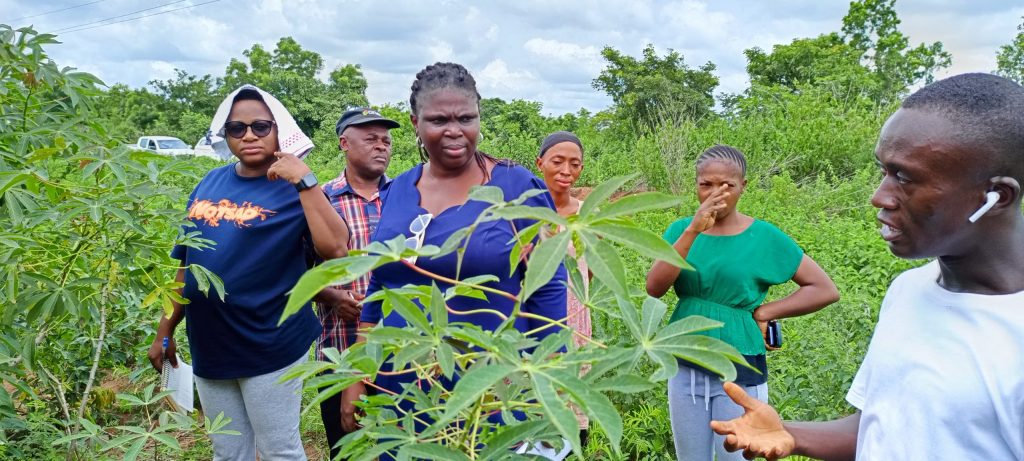6 November 2024
Originally published on IITA.
We have prepared a two-part blog explaining the “tricot” method and detailing the approach for on-farm testing for variety release (Part 1) and featuring the monitoring and inspection part with partners (Part 2).
Part 1 introduces the tricot approach for on-farm testing for cassava varieties.

The cassava breeding stage gate process is a meticulously structured series of evaluations that validates the performance of new cassava genotypes. One of the critical last steps in this process is the on-farm testing of variety candidates proposed for varietal release to evaluate their performance in farmers’ fields. This step is essential to confirm if these new genotypes perform well under real-world farming conditions. This includes monitoring and inspection activities in collaboration with the National Variety Release Committee. The goal is to identify the genotypes that can be proposed for official registration and release.
Using the Tricot method in on-farm testing
To enhance the accuracy and effectiveness of this on-farm evaluation, we, the joint breeding program IITA and the National Root Crops Research Institute (NRCRI) partnered with the Collaborative Seed Program including the National Variety Release Committee (NVRC) at National Centre for Genetic Resources and Biotechnology (NACGRAB) in Nigeria, to introduce an innovative alternative on-farm testing method called “tricot” (triadic comparison of technologies). This method, adopted and adapted to cassava after testing it for two years, engages cassava farmers and processors as ‘citizen science partners’ in testing and validating genotypes before their official release. We adapted the method together with the inventers of the tricot approach, within the 1000farms1 project.
The tricot method simplifies the evaluation process for participating farmers and processors. Each participant evaluates only three varieties out of a larger number of genotypes under real farm conditions, using their usual management practices. The tricot setup is therefore an incomplete block design with blocks of three varieties following a sequentially balanced Placket Luce randomization (a model for rankings data).
Farmers rank these three varieties based on a suite of traits along the value chain, such as overall impression, yield, disease resistance, taste, marketability, and food product quality, thus significantly covering postharvest stages such as processing evaluation and food product quality as part of the on-farm trial testing. This approach not only makes the evaluation process more manageable for farmers, facilitating more bonding with each of the varieties, but also involves a larger number of people across a larger area making the on-farm testing more representative.
Engaging farmers as citizen scientists makes them feel that they are partners rather than mere respondents in the evaluation and breeding process, resulting in a co-design process. This inclusive approach is key to facilitating improved adoption and more optimal utilization of the released genotypes.
Pioneering the Tricot method in Nigeria
For the root, tuber, and banana crops, the IITA and NRCRI breeding team is leading the way in using the tricot on-farm testing method in Nigeria, working closely with farmers and processors. As part of plans to release promising genotypes in the 2024/2025 cycle, we have selected eight cassava genotypes for evaluation. This selection includes four promising genotypes at an advanced breeding stage, one currently released cassava variety, a national check, and two varieties popular among farmers.

We planted all the genotypes in farmer-managed trials across selected communities in Abia, Akwa Ibom, Benue, Imo, Osun, and Oyo States covering two agroecological zones in Nigeria. In each state, evaluation was done with 20 farmers, thus resulting in a total of 120 farmers, each evaluating a tricot trial. Each farmer planted his/her own preferred cassava variety alongside the three varieties received from the institutes. Farmers were carefully selected based on criteria such as expertise in cassava farming and processing, as well as socially inclusive criteria such as locally relevant social groups, men and women and people involved in cassava stem selling to also capture the needs of the growing cassava seed business. Stem sellers were identified through the BASICS[2] project.
When the trials reached nine months after planting, an inspection was carried out –together with the variety release committee. Watch out for the next story on this inspection on this space.
1 The 1000farms project is a Bill & Melinda Gates Foundation-funded project that aims to implement an Africa-wide network for on-farm variety testing that is digitally supported to provide vital performance data and farmer feedback to accelerate breeding of new climate-adapted and farmer-preferred crop varieties.
2 Building an Economically Sustainable and Integrated Cassava Seed System (BASICS) is a Bill & Melinda Gates Foundation-funded project led by IITA and partners, which include NRCRI and TARI (Tanzania Agricultural Research Institute). The project aims to transform the cassava seed sector by promoting the dissemination of improved varieties, thereby creating a community of seed entrepreneurs across the cassava value chain.
Authors
Abolore Bello (Senior Research Supervisor, IITA)
Olamide Olaosebikan (Senior Research Associate, IITA)
Samuel Onwuka (Principal Researcher and Development Expert)
Favour Okeakpu (Cassava Coordinator, NRCRI)
Benjamin Okoye (Senior Researcher and Market Production Specialist, NRCRI)
Tessy Ugo Madu (Research Director, NRCRI)
Béla Teeken (Associate Scientist, IITA)
Anthony Okere (Director NACGRAB and Registrar, NVRC)
Ibidunni Adetiloye (Desk Officer, NVRC)
Ismail Rabbi (Head cassava breeding, IITA)
Elisabeth Parkes (Cassava breeder SAH, IITA)
Ukoabasi Ekanem (Breeding Data manager, IITA)
Esezobor Oke (Senior research supervisor, IITA)
Andrew Ikpan (Research support officer, IITA)
Peter Iluebbey (International trial manager, IITA)
Vishnuvardhan Banda (Product manager for crop variety development, IITA)
Ismail Kayondo (Cassava breeder, IITA)
Sikirou Mouritala (Cassave breeder, IITA)
Damian Ndubuisi (Cassava breeder, director NRCRI)
Mercy Ejechi (Social scientist, NRCRI)
Joseph Onyeka (Director of Research, NRCRI)
Solomon Afuape (Assistant director and sweet potato breeder, NRCRI)
Chiedozie Egesi (Executive Director/CEO NRCRI)
Peteti Prasad (Cassava Database programmer and Manager, IITA)
Ugo Chijioke (Food scientist, NRCRI)
Mercy Elohor Diebiru-Ojo (Cassava seed system specialist, IITA)


